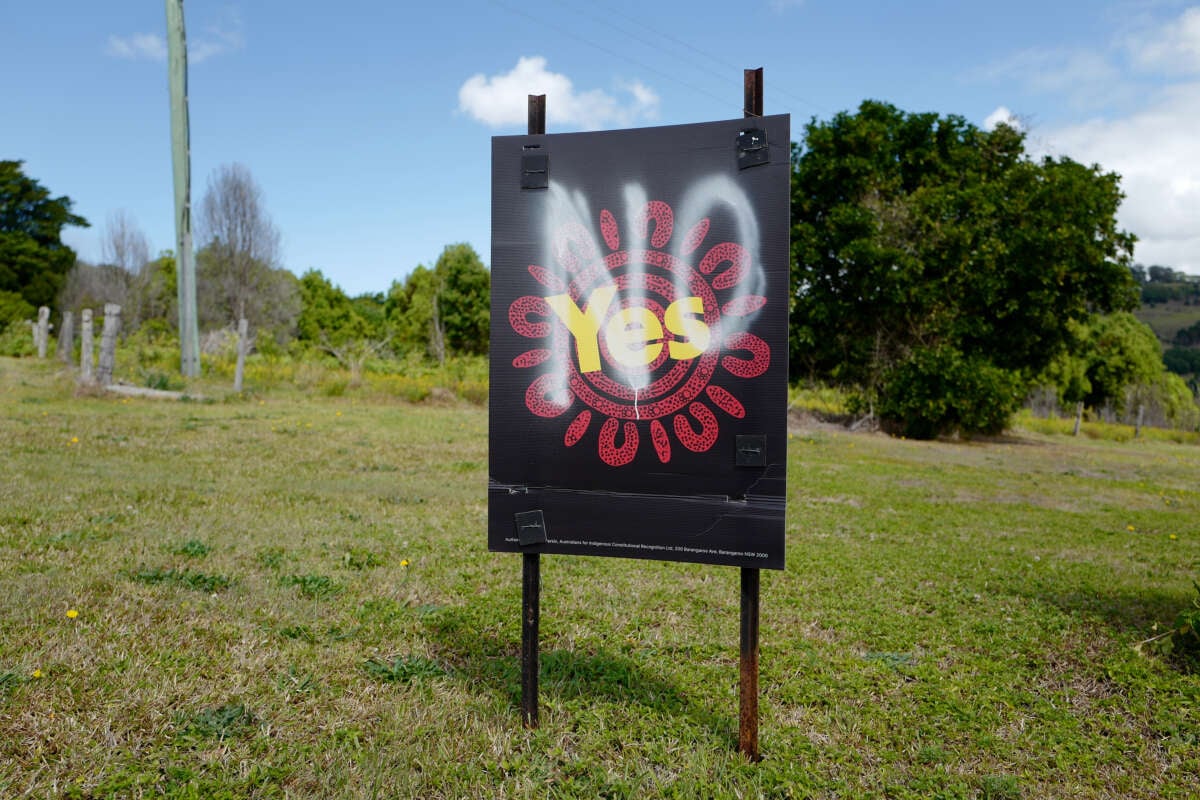Indigenous groups in Australia on Sunday called for a “Week of Silence” beginning Saturday night to protest what one campaigner called the “gut-wrenching” outcome of a referendum that would have formally recognized Indigenous Australians in the country’s Constitution and created a body to advise the government on policies that affect them.
Communities with large populations of Aboriginal people and Torres Strait Islanders voted overwhelmingly for the referendum, but nationwide, 60.4% of voters sided with a “No” campaign that relied on misleading the public about how the new policies would be implemented.
“It’s very sad and it’s grieving,” Hannah McGlade, a member of the United Nations permanent forum on Indigenous issues, told The Guardian. “The majority of Australian people could not see the sense in finally recognizing Aboriginal people.”
Groups including the Central Land Council and the Central Australian Aboriginal Congress said the vote represented “a bitter irony” as they called for a week of silence “to grieve this outcome and reflect on its meaning and significance.”
“That people who have only been on this continent for 235 years would refuse to recognize those whose home this land has been for 60,000 and more years, is beyond reason,” they said.
But they groups said they “will not rest long.”
“Fly our flags low. Talk not of recognition and reconciliation. Only of justice and the rights of our people in our own country,” the groups said. “Re-gather our strength and resolve, and when we determine a new direction for justice and our rights, let us once again unite. Let us convene in due course to carefully consider our path forward.”
Communities of Aboriginal people and Torres Strait islanders suffer higher rates of suicide, domestic violence, and incarceration than the rest of the Australian population, particularly in remote, rural parts of the country.
“If only people down south had seen what Aboriginal people in the bush were voting for, then maybe we would have had a different result,” Marion Scrymgour, a member of Parliament for the Labor Party who represents Lingiari in the Northern Territory, told The Guardian. Forty percent of Scrymour’s constituents are Indigenous, and 74 percent of the people living in the division’s most remote areas voted for the “Voice” referendum.
Conservative campaigners spent months encouraging voters who were unfamiliar with the referendum to vote “No” instead of learning more about it, with the slogan, “If you don’t know, vote no.” They also repeatedly asked, “Where’s the detail?” despite the “Yes” campaign stating that Parliament would determine the exact implementation of the new policies after the vote, and claimed passing the referendum would be “constitutionally risky” and divide the country by race by introducing the concept into the Constitution.
Dozens of constitutional experts and law professors signed a letter earlier this month rejecting those claims.
“The original Constitution was approved through referendums in each of the colonies, but many people, including women, Aboriginal and Torres Strait Islander peoples and people who did not own property, had limited or no voting rights,” wrote the experts. “The framers (who were all white men) included the concept of ‘race’ within the Constitution, as they intended for the new Commonwealth Parliament to be able to pass laws that discriminated against people on the basis of race. In particular, they sought to pursue the White Australia Policy, where the rights of white Australians were given preferential treatment in relation to immigration, employment, and movement. As such, whether or not we agree that the Constitution should continue to embed this concept, it is wrong to frame the Voice as introducing a racial divide into the Constitution. The racial divide has always been there.”
Prime Minister Anthony Albanese, celebrities, prominent retired judges, and universities were among those that backed the campaign to formally recognize the Indigenous people who make up 3.8 percent of the Australian population.
Human Rights Watch called on the Australian government to “prioritize the views of Indigenous communities” in its next steps.
“The United Nations Declaration on the Rights of Indigenous Peoples, which was endorsed by Australia in 2009, recognizes that Indigenous people have the right to participate in decision-making in matters that would affect their rights, and that governments should consult with Indigenous people before making laws that affect them,” said Daniela Gavshon, the group’s Australia director. “It is a blight on Australia’s history that successive governments of various political persuasions have failed to uphold the rights of First Nations people.”
3 Days Left: All gifts to Truthout now matched!
From now until the end of the year, all donations to Truthout will be matched dollar for dollar up to $38,000! Thanks to a generous supporter, your one-time gift today will be matched immediately. As well, your monthly donation will be matched for the whole first year, doubling your impact.
We have just 3 days left to raise $38,000 and receive the full match.
This matching gift comes at a critical time. As Trump attempts to silence dissenting voices and oppositional nonprofits, reader support is our best defense against the right-wing agenda.
Help Truthout confront Trump’s fascism in 2026, and have your donation matched now!
